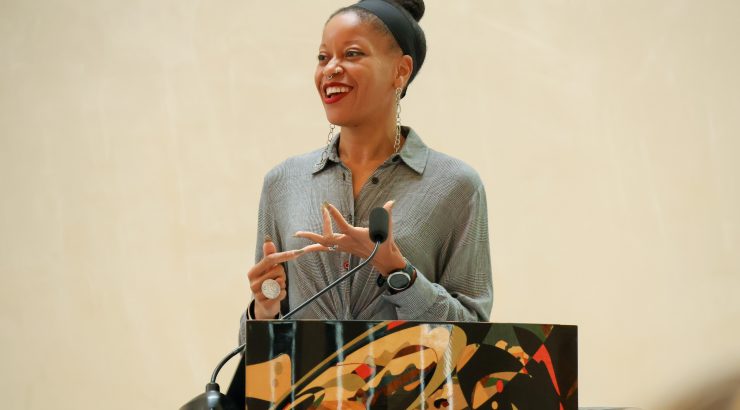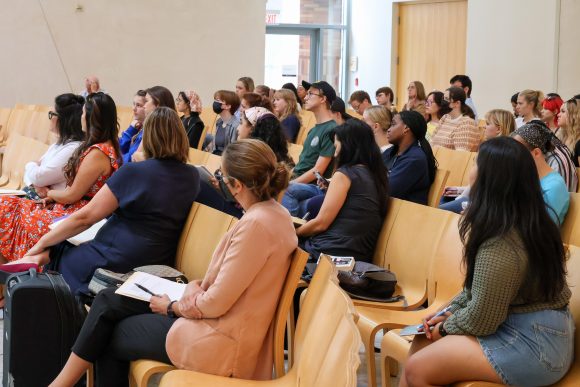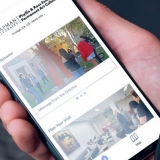
Celebration of the International Day of Peace
October 3, 2023
Khiara M. Bridges, J.D. Ph.D. recently spoke at the Celebration of the International Day of Peace, an event sponsored by The Department of Peace Studies in the Wilkinson College of Art, Humanities, and Social Sciences. Dr. Bridges is a professor of law at UC Berkeley school of law and focuses on the intersection of race, class, and reproductive rights.
In her presentation, “A Primer on Abortion Rights and Dobbs v. Jackson Women’s Health Organization,” Bridges constructed a solid background on abortion, its history and its accessibility within the United States. Roe v. Wade (1973) was a landmark decision of the U.S. Supreme Court in which the Court ruled that the Constitution of the United States generally protected a right to have an abortion. “A woman’s right to terminate her pregnancy before viability is the most central principle of Roe. It is a rule of law and a component of liberty we cannot renounce,” she stated.
Dobbs v. Jackson Women’s Health Organization (2022) is a landmark decision of the U.S. Supreme Court in which the court held that the Constitution of the United States does not confer a right to abortion, overturning Roe v. Wade (1973). This recent decision by the U.S. Supreme Court calls into question specifically what demographic will be most affected by the limited access to abortion specific healthcare as well as how a decision like this will impact other constitutional rights. Bridges drew attention to how Dobbs puts several other constitutional rights in jeopardy such as Griswold v. Connecticut (1965) which protects the right to access contraception, Lawrence v. Texas (2003) which protects the right to consensual sex with adults of the same sex, and Obergefell v. Hodges (2015) which guarantees the right to same-sex marriage.
According to Dr. Bridges, people will attempt to circumvent abortion restrictions by traveling to states and countries where abortion is still legal.
“Dr. Bridges was incredibly insightful to the true aims of reproductive justice and the barriers that stand in its way,” said Breil Bonaguro, (Peace Studies and Political Science, ‘21) Chapman Graduate. “One of the most interesting components of the lecture was the discussion of the Hyde amendment and the limitations on federally funded healthcare which make abortions virtually impossible to obtain for those that do not have the means to pay out of pocket.”
“Travel is difficult, and sometimes, impossible for poor people, people with disabilities, survivors of domestic violence, young people, and undocumented people. Black people make up a disproportionate number of those receiving abortions and disproportionately bear the burdens of poverty in the U.S.,” said Dr. Bridges.
This decision does not make abortions obsolete, but rather creates more barriers and dangers to the already underprivileged people attempting to obtain safe and effective contraception. Despite how bleak the world feels after Dobbs, she urged the audience to imagine a world where every school has comprehensive sex education, everyone has a living wage, and secured housing so that hopefully in the future abortion is still accessible to whoever needs or wants it, but is not considered necessary due to financial hardship.
“Chapman’s annual International Day of Peace celebration year focuses students on issues and changes they can be involved in making. This year’s talk by Dr. Bridges provided an opportunity to see the inter-relations of bodily autonomy, race, class, and of course gender; it was an exceptional talk to understand how reproductive justice is necessary for peace. Since many people misunderstand that peace is only needed “over there” this event demonstrates how peace and justice are interrelated and needed here at home,” said Dr. Lisa Leitz, Delp-Wilkinson Professor of Peace Studies and Associate Professor of Sociology.
(Header photo by: Ava Brandt)


